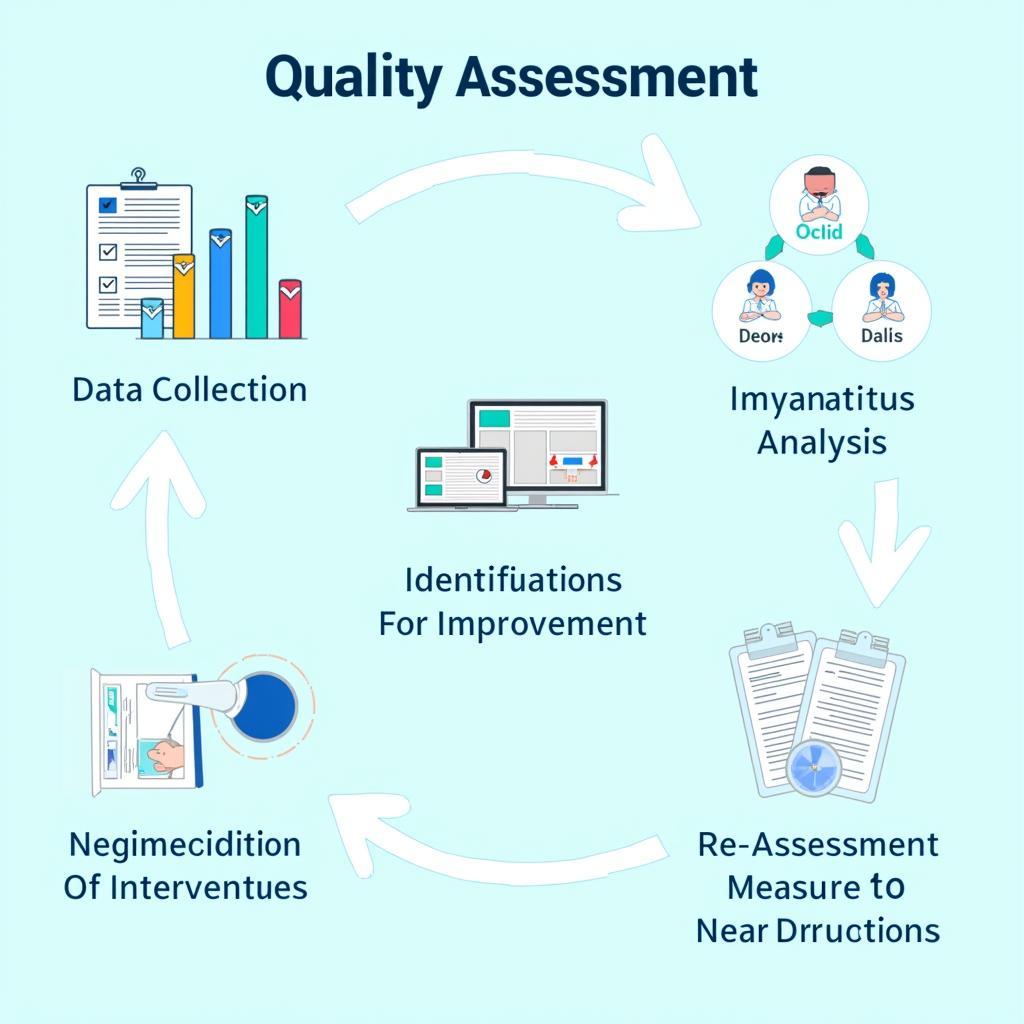Quality assessment tools play a vital role in ensuring excellent health care delivery. They provide a structured approach to evaluating the effectiveness of services, identifying areas for improvement, and ultimately, enhancing patient outcomes. This article delves into the diverse world of quality assessment tools in health care, exploring their types, applications, and the impact they have on shaping the future of health care.
Understanding the Importance of Quality Assessment Tools
Quality in health care isn’t just about providing treatment; it’s about delivering the right treatment, at the right time, in the right way. This is where quality assessment tools come in. They offer a framework for objectively measuring performance against established standards and identifying gaps in care. By systematically collecting and analyzing data, these tools empower health care providers to make informed decisions, implement targeted interventions, and continuously improve the quality of care. Early identification of these gaps can significantly improve patient outcomes and overall satisfaction.  The Importance of Quality Assessment Tools in Healthcare
The Importance of Quality Assessment Tools in Healthcare
Quality assessment tools are also crucial for demonstrating accountability and transparency. In an increasingly complex and demanding health care landscape, demonstrating value and ensuring optimal resource utilization is paramount. These tools provide the evidence needed to demonstrate the effectiveness of interventions, justify resource allocation, and build trust with patients and stakeholders. They also help in identifying areas where resources can be better utilized to maximize their impact. For instance, tools to identify gaps in health care are essential for resource optimization.
Types of Quality Assessment Tools
The landscape of quality assessment tools in health care is diverse, ranging from simple checklists to sophisticated data analysis systems. Broadly, these tools can be categorized into:
- Structure measures: These tools assess the context in which care is delivered, including facilities, equipment, staffing levels, and organizational policies.
- Process measures: These tools evaluate the activities involved in providing care, such as adherence to clinical guidelines, communication practices, and patient education. For example, process measures might track the percentage of patients receiving appropriate preventative screenings.
- Outcome measures: These tools focus on the results of care, including patient health status, functional ability, satisfaction, and mortality rates.
Each type of tool offers a unique perspective on quality and can be used in combination to provide a comprehensive assessment. Choosing the right tools depends on the specific goals of the assessment and the characteristics of the health care setting.
How Quality Assessment Tools Drive Improvement
The true power of quality assessment tools lies in their ability to drive meaningful improvements in health care. By pinpointing areas of weakness, these tools enable providers to develop targeted strategies for enhancing care. This might involve implementing new protocols, providing additional training to staff, or redesigning care processes. The cyclical process of assessment, intervention, and re-assessment ensures continuous quality improvement and promotes a culture of excellence.
 How Quality Assessment Tools Drive Improvement in Healthcare
How Quality Assessment Tools Drive Improvement in Healthcare
For example, person centered care tools can be used to understand patient preferences and tailor care plans to meet their individual needs. This not only improves patient satisfaction but also contributes to better health outcomes.
“Effective quality assessment relies on choosing the right tools for the specific context and ensuring they are used consistently and appropriately,” notes Dr. Emily Carter, a leading expert in health care quality improvement. “The data generated from these tools must be translated into actionable insights that drive real change.”
Choosing the Right Quality Assessment Tools
Selecting the appropriate quality assessment tools requires careful consideration of various factors. The specific objectives of the assessment, the type of health care setting, the available resources, and the characteristics of the patient population all play a role in the decision-making process. It’s essential to choose tools that are reliable, valid, and feasible to implement.
Moreover, the tools should be aligned with national quality standards and best practices. This ensures that the assessment is relevant and contributes to broader efforts to improve health care quality across the system. It’s also important to engage stakeholders in the selection process to ensure buy-in and support for the assessment process.
Quality Assessment and the Future of Health Care
Quality assessment is becoming increasingly important as health care systems worldwide grapple with rising costs, increasing patient demands, and the need to improve outcomes. The use of sophisticated data analytics, coupled with advanced quality assessment tools, is transforming the way care is delivered. These tools are empowering providers to make more informed decisions, personalize care, and improve the efficiency and effectiveness of health care services. Tools such as palliative care communication tools have become essential for improving end-of-life care.
 The Future of Quality Assessment Tools in Healthcare
The Future of Quality Assessment Tools in Healthcare
Furthermore, the growing emphasis on patient-centered care is driving the development of new quality assessment tools that focus on patient experience and outcomes. These tools are helping to shift the focus from simply providing treatment to ensuring that care is delivered in a way that is respectful, responsive, and meets the unique needs of each individual. For example, advance care planning tool for home health is a valuable resource for ensuring patient-centered care in home settings. Similarly, the use of palliative care trigger tools in icu has significantly improved the quality of care in intensive care units.
“The future of health care hinges on our ability to continuously improve the quality of care we deliver,” says Dr. David Miller, a renowned health care policy expert. “Quality assessment tools are the key to unlocking this potential and creating a more efficient, effective, and patient-centered health care system.”
Conclusion
Quality assessment tools are indispensable for ensuring high-quality health care. By providing a structured approach to evaluating performance, identifying areas for improvement, and driving continuous quality improvement, these tools are essential for enhancing patient outcomes, promoting accountability, and shaping the future of health care. Embracing the power of quality assessment is crucial for building a health care system that is truly patient-centered, efficient, and effective.
FAQ
- What are the main types of quality assessment tools?
- How do quality assessment tools improve patient care?
- What factors should be considered when choosing quality assessment tools?
- How are quality assessment tools used in different health care settings?
- What is the role of technology in quality assessment?
- How can quality assessment tools be used to measure patient satisfaction?
- What are some examples of common quality assessment tools used in hospitals?
Need help with your car diagnostics? Contact us via WhatsApp: +1(641)206-8880, Email: [email protected] or visit us at 910 Cedar Lane, Chicago, IL 60605, USA. Our customer support team is available 24/7.

Leave a Reply